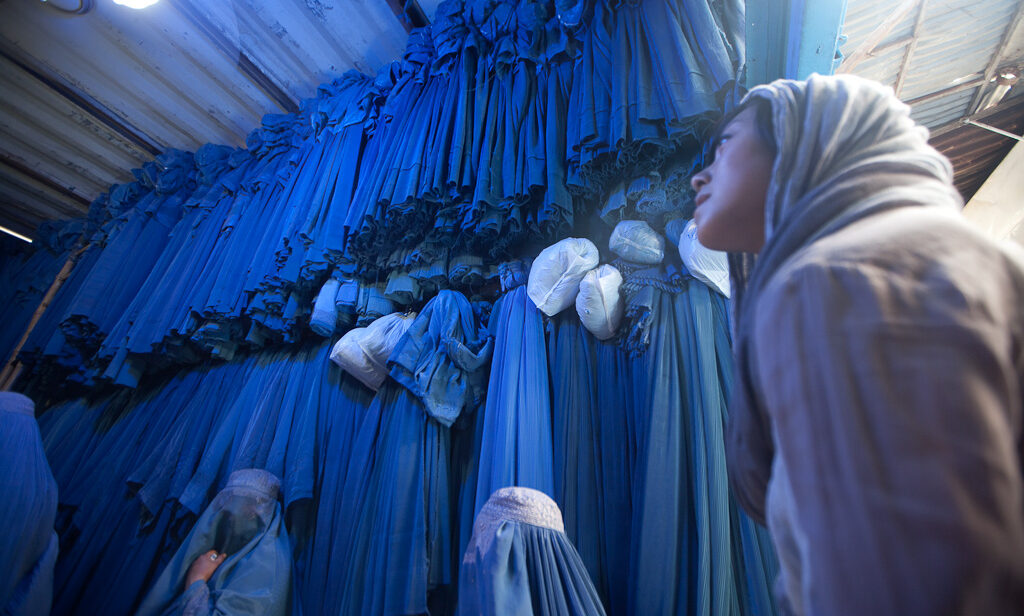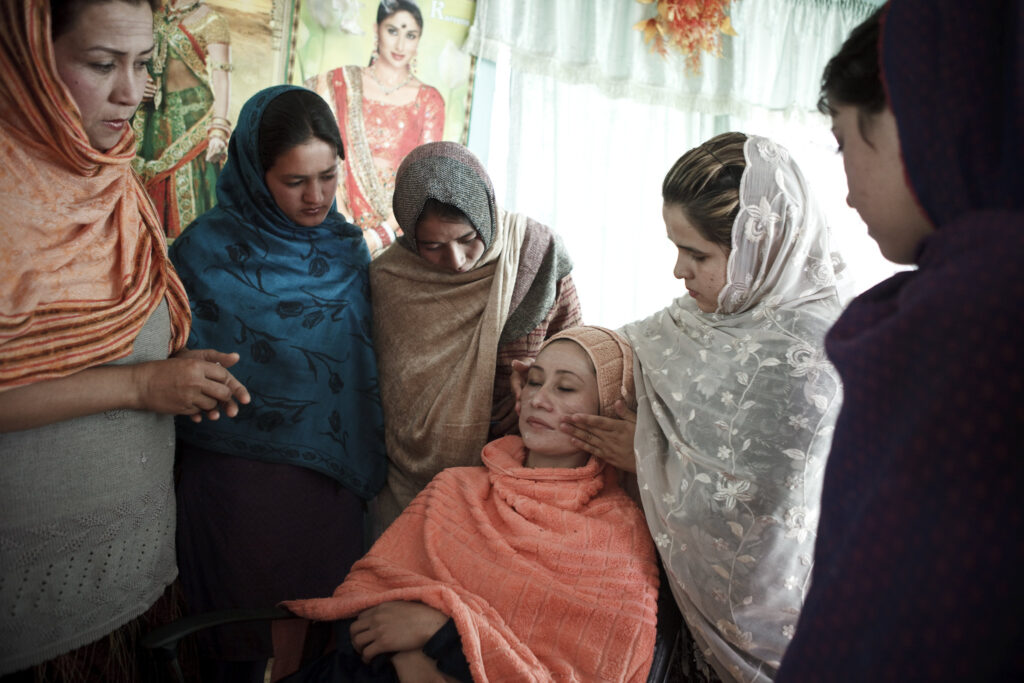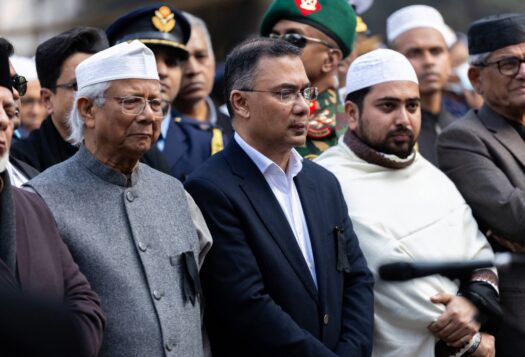
In his first-ever public appearance on August 17, Taliban spokesperson Zabihullah Mujahid emphasized that women’s rights in a Taliban-controlled Afghanistan will be protected, promising that the Taliban would respect women’s rights within the norms of their interpretation of Sharia law. Yet, the Taliban’s restrictive policies and decrees over the past eight months tell another story. Afghan women have increasingly been deprived of their rights, including their rights to work, pursue an education, access to opportunity and healthcare, right to peaceful assembly, and freedom of expression.
The Taliban’s initial promise to guarantee women’s rights has yet to materialize despite the group capturing control of Afghanistan eight months ago. The international community should take concrete measures to use their leverage by conditioning international aid, recognition, and diplomatic engagement on the Taliban making policy changes—with verifiable implementation—to protect Afghan women.
Reversing Hard-Earned Gains
The Taliban have reversed gains in Afghan women’s rights, most notably in major cities where women actively participated in political, social, and economic activity before the takeover. Herat—a city where women are now absent from public and private offices, universities, and schools—was previously a hub for female activists, educators, students, dreamers, and entrepreneurs, with gender disparity gradually narrowing before the Taliban took control on August 12.
Susan Ehsan Behboodzadah—Herat Province’s first female mayor of Injil District before she was removed from her role by the Taliban—witnessed her position once again occupied by a man. In 2020, women officials comprised half of the Herat Department of Urban Development and Land, where they applied their knowledge and skills to develop their province’s land-management systems. Beyond the Department, women comprised 38 percent of civil servant positions in Herat. Pre-takeover Afghanistan expected even greater female representation in government: in 2019, over half of the applicants in Herat province’s Kankor exam (also known as the university national entrance exam) were women.
Similarly, in pre-takeover Afghanistan, female entrepreneurs led several successful businesses, creating hundreds of jobs for other women to improve their livelihood. From operating small restaurants and cafés to overseeing Afghanistan’s Saffron cultivation, agriculture, and technological development, Herati women had carved an important place and positively contributed to Afghanistan’s economy. Unfortunately, the Taliban took measures to subvert all gains in a matter of weeks.
Women have largely disappeared from public spaces as the Taliban has forced them from returning to work or school and banned their participation in social and political affairs.
Since the Taliban’s takeover, while boys have pursued their education uninterrupted, girls over twelve have not been permitted to attend school. Officials partially adapted this policy in February 2022. Universities in some provinces (including Kabul University) reopened with female students allowed on campus for the first time since the takeover, albeit with strict rules such as segregated classrooms, no interaction with members of the opposite gender, enforced interpretations of Islamic dress codes, and prohibition of cell phones inside the university. This policy revision may seem like progress, but the Taliban’s draconian stances based on the group’s radical interpretation of Shariah Law translates into an effectively similar policy for most Afghan girls and women.
Women have largely disappeared from public spaces as the Taliban has forced them from returning to work or school and banned their participation in social and political affairs. Thousands of female educators, journalists, judges, activists, artists, and politicians have fled the country citing fear, and thousands of others are in hiding. The Taliban replaced the Ministry of Women’s Affairs—an agency for promoting women’s rights and eliminating gender-based violence and discrimination—with the Ministry for the Propagation of Virtue and the Prevention of Vice. This ministry enforces the militants’ same interpretation of Shariah law from two decades ago. Female protesters, who have demanded their most basic rights be met, have been repeatedly beaten, whipped, arrested, and detained by the Taliban on the streets of Kabul.

The Taliban’s Policy Impact on Afghan Women:
The Taliban prevents women’s empowerment and seeks to seize every tool that can facilitate it—notably access to education. The Taliban’s misogynistic policies create distinctions between men’s and women’s role(s) in society. In the first weeks of seizing power, the Taliban announced that only women who were doing jobs that men could not do were permitted to work. The fundamentalist group also stopped women from leaving their homes unaccompanied by men, forcing women to cover their entire bodies according to their understanding of Islamic dress codes. By bifurcating societal roles, primarily through patriarchal and paternalistic understandings of what it means to be a member of society, the Taliban has limited women’s agency and ability to act. This widens the gender disparity gap in society and pushes women into constrictive reproductive roles.
The Taliban’s policies against women have fostered early, and in some cases, forced marriage. UNICEF has predicted that child marriages will increase in Afghanistan following the takeover. In just one example, one teacher reported that at least three school-going girls, all under 15, were married off since the Taliban took power, adding that she fears more would follow as parents fear their children “doing nothing” at home. Losing sources of income, unpaid salaries, and rising poverty are other driving factors for families to sell, coerce, or pressure their daughters into early marriage. The Taliban’s sexist laws and regulations also push women toward another era of sexual slavery and trafficking. Violating women’s fundamental rights to education and employment has had a catastrophic impact on women’s daily lives and, in turn, on the collective future of Afghanistan.
Violating women’s fundamental rights to education and employment has had a catastrophic impact on women’s daily lives and, in turn, on the collective future of Afghanistan.
Many world leaders, including U.S. President Joe Biden, pledged that the withdrawal would not mark an end to the international community’s efforts to support Afghan women’s rights and civil society. While Washington has provided significant humanitarian aid following the takeover, Afghanistan remains without access to its complete foreign exchange reserves — money rightfully owned by Afghan people — that are held in the New York Treasury. The Biden administration separated half of the USD $7 billion reserves for future use by the Afghans while leaving the other half beholden on U.S. court decisions related to 9/11 family victims. As Afghanistan faces one of the worst humanitarian crises, most working women (who are sometimes the sole breadwinners of their families) lose their ability to feed themselves or their families. The brutality of the Taliban regime has stripped away women’s hard-won rights, freedoms, and gains over the past 20 years. Systemic gender discrimination is enclosing Afghan society once again. This time, there are no real signs of a turnaround.
Conclusion
While there is widespread violation of human rights against almost all Afghans, the Taliban has systematically targeted women’s rights, curtailing women’s role in public spaces, dignity, education, work, and future aspirations. Instead of disengaging politically and diplomatically, the international community should concentrate on actions that can lead to a tangible improvement in women’s rights and security.
Donor countries, including the United States, should not count on words or intangible commitments when it comes to the Taliban’s promises on women’s fundamental human rights.
The international community should use its leverage over the Taliban—through targeted sanctions, humanitarian aid, political and diplomatic pressure on the Taliban, and friendly countries towards the group—to incentivize the Taliban towards taking corrective action. The international community should condition future international aid, recognition, and removal of sanctions—as well as more formal political, economic, and diplomatic relations—on clearly codified standards relating to women’s rights that are verifiable on the ground.
In the interim, the United States and its NATO allies should ensure a safe passage for human rights activists, judges, women journalists, policewomen, or service officers in Afghan National Security Forces. This includes placing women in the priority group for emergency visas and relocation support.
The United States must strongly encourage the role of the United Nations Assistance Mission in Afghanistan (UNAMA) in the protection and promotion of human rights in Afghanistan. The United States should ensure that UNAMA receives support to monitor human rights abuses, produce reports on violations, and create advocacy through strategic partnerships to help eliminate violence against women.
The extent to which the Taliban violate Afghan women’s rights and freedom is unparalleled in recent history. With the memory of the late 1990s in mind, the international community should not hesitate to take extreme measures against the Taliban should they continue to impose extreme measures on Afghan women’s rights.
***
Image 1: Institute for Money, Technology and Financial Inclusion via Flikr
Image 2: Sandra Calligaro via Flikr


